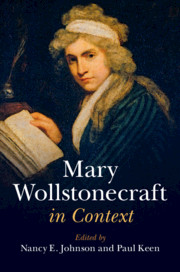Book contents
- Mary Wollstonecraft in Context
- Mary Wollstonecraft in Context
- Copyright page
- Contents
- Illustrations
- Notes on Contributors
- Preface
- Frontispiece
- Chronology
- Part I Life and Works
- Part II Critical Fortunes
- Chapter 5 Early Critical Reception
- Chapter 6 Nineteenth-Century Critical Reception
- Chapter 7 1970s Critical Reception
- Chapter 8 Recent Critical Reception
- Part III Historical and Cultural Contexts
- Suggested Further Reading
- Index
Chapter 5 - Early Critical Reception
from Part II - Critical Fortunes
Published online by Cambridge University Press: 16 January 2020
- Mary Wollstonecraft in Context
- Mary Wollstonecraft in Context
- Copyright page
- Contents
- Illustrations
- Notes on Contributors
- Preface
- Frontispiece
- Chronology
- Part I Life and Works
- Part II Critical Fortunes
- Chapter 5 Early Critical Reception
- Chapter 6 Nineteenth-Century Critical Reception
- Chapter 7 1970s Critical Reception
- Chapter 8 Recent Critical Reception
- Part III Historical and Cultural Contexts
- Suggested Further Reading
- Index
Summary
In a span of just over ten years, the reception of Mary Wollstonecraft’s work moved from temperate admiration to heightened political controversy, emotional sympathy, and personal condemnation. When Wollstonecraft wrote about female education, her ideas were generally well received. At times her thoughts were dismissed as trite or she was admonished for encouraging young women to be too independent. But she was in safe territory. Predictably, when Wollstonecraft entered into political and cultural controversies, her thoughts were either embraced because they aligned with theories of the rights of man, or they were thought to be revolutionary and a challenge to British stability. Most controversial was Wollstonecraft’s suggestion that women actively participate in civil society. In this case, she drew censorious responses from parties at both ends of the political spectrum. Her later publications, including posthumous work published by her husband, William Godwin, elicited starkly personal reactions, ranging from sympathy for her emotional turmoil, and pity because her husband made her intimate life public, to outrage over her sexual behavior and condemnation of her dubious moral conduct. Wollstonecraft’s early reception was charged with the controversies of the 1790s and marked by the uncertainty surrounding the place of women in the transformation of civil society.
- Type
- Chapter
- Information
- Mary Wollstonecraft in Context , pp. 41 - 49Publisher: Cambridge University PressPrint publication year: 2020



